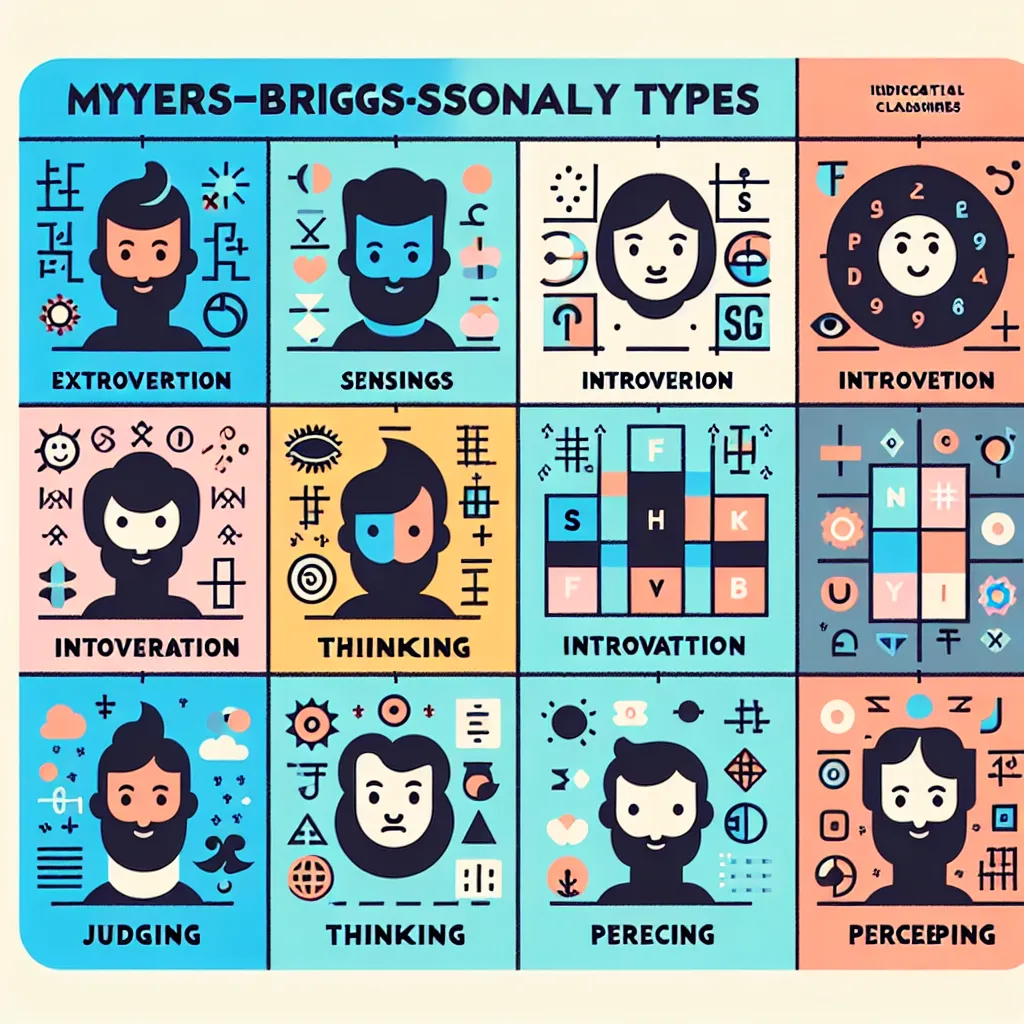Understand Your Unique Personality: Exploring the Myers-Briggs Type Indicator
Have you ever wondered why you interact with the world in a particular way? Why some activities energize you while others leave you drained? Why you resonate with certain individuals and clash with others? The answer could lie in your Myers-Briggs Personality Type.
The Myers-Briggs Type Indicator (MBTI) is a widely-used personality assessment tool that helps individuals understand their psychological preferences. Based on the theory of psychological types developed by Carl Jung, the MBTI was created by mother-daughter duo Isabel Myers and Katharine Briggs to make Jung’s theory more accessible. The assessment analyzes four dichotomies to determine which of 16 personality types best describes an individual. Let’s break down each dichotomy.
Extraversion (E) vs. Introversion (I): Energy Orientation
The first dichotomy contrasts Extraversion and Introversion, focusing on how individuals draw their energy. Extraversion is characterized by a focus on the external world and interaction with people. Extraverts are often seen as outgoing and thrive on active involvement in events. Introversion, on the other hand, involves drawing energy from one’s internal world. Introverts are typically more reserved and prefer solitary activities or small-group interactions.
Sensing (S) vs. Intuition (N): Information Processing
Sensing and Intuition relate to how people collect and process information. Sensors focus on the realities of their environment, keenly attuned to what they can perceive through their five senses. They tend to be pragmatic and detail-oriented. Conversely, Intuitives are more concerned with patterns and possibilities. They think abstractly and are often imaginative, focusing more on what might be rather than what is.
Thinking (T) vs. Feeling (F): Decision-Making
The third dichotomy divides Thinkers and Feelers by how they prefer to make decisions. Thinkers tend to decide based on objective logic and principles, prioritizing truth over tact. They are analytical and make choices that seem more reasonable, regardless of personal considerations. Feelers prioritize harmony and the concerns of others, often employing empathy and considering social implications when making decisions.
Judging (J) vs. Perceiving (P): Lifestyle
Finally, Judging and Perceiving pertain to one’s approach to structure in their life. Individuals who prefer Judging appreciate orderliness and prefer to have plans and clear expectations. They tend to be organized and decisive. Perceivers are more adaptable and open to new information and experiences. They are more spontaneous and prefer to keep their options open.
Now, combining these dichotomies, we get 16 distinct personality types, each identified with a four-letter code. Here’s a brief overview of each:
ISTJ – The Inspector
ISTJs are dependable and meticulous, valuing traditions and loyalty. They are practical and responsible, known for their attention to detail and systematic approach to life.
ISFJ – The Protector
ISFJs are caring and supportive, eager to help others in practical ways. They are meticulous and have a strong sense of duty, often working behind the scenes to ensure others’ well-being.
INFJ – The Counselor
INFJs are visionaries with deep convictions about significant matters. They are often creative and determined, seeking meaning in relationships, ideas, and events.
INTJ – The Mastermind
INTJs are strategic and logical, with a natural thirst for knowledge. They are confident in their capabilities and often have a clear vision of how to solve complex problems.
ISTP – The Craftsman
ISTPs are observant and hands-on learners. They excel in understanding how things work and are flexible in their approach to problem-solving.
ISFP – The Composer
ISFPs are gentle and compassionate, living in the present moment. They are adaptive and enjoy exploring new environments and experiences.
INFP – The Healer
INFPs are idealistic and empathetic, guided by their strong personal values. They seek harmony and often have a talent for expressing themselves through language and art.
INTP – The Architect
INTPs are curious and analytical, often exploring theoretical concepts. They are focused on innovation and relishing the search for understanding.
ESTP – The Dynamo
ESTPs are energetic and action-oriented. They are pragmatic and resourceful, enjoying a good challenge and living in the moment.
ESFP – The Performer
ESFPs are vivacious and engaging, fostering an environment of excitement. They enjoy the spontaneous moments of life and are adept at improvising.
ENFP – The Champion
ENFPs are enthusiastic innovators, motivated by possibilities. They are charismatic and empathetic, often inspiring others to achieve their potential.
ENTP – The Debater
ENTPs are witty and inventive, thriving on the challenge of understanding complex concepts. They are often keenly perceptive of others’ thoughts and motives.
ESTJ – The Supervisor
ESTJs are practical and straightforward, valuing order and structure. They are decisive leaders who are skilled at organizing projects and people.
ESFJ – The Provider
ESFJs are gracious and considerately attuned to others’ needs. They value harmony and cooperation, often excelling in situations where they can help and guide.
ENFJ – The Teacher
ENFJs are empathetic and persuasive, often acting as catalysts for growth. They are supportive and enthusiastic, capable of inspiring others toward personal development.
ENTJ – The Commander
ENTJs are assertive and outspoken, thriving on bringing order out of chaos. They are strategic leaders with a clear vision for how things should be.
Understanding your MBTI type offers valuable insights into your work preferences, relationships, and communication style, providing a basis for personal growth and self-awareness. Organizations also leverage MBTI to promote teamwork and understand employee dynamics.
It’s important to note that the MBTI merely outlines preferences, not abilities or character. Your personality type doesn’t limit what you can achieve; rather it can empower you to make choices that align with your natural inclinations. Moreover, while the MBTI is a powerful tool for self-discovery, it’s most beneficial when utilized as a component of a broader exploration of one’s personality and individuality.
Overall, the Myers-Briggs Personality Types provide a framework through which we can understand our intricate personalities. With this knowledge, you can navigate your personal and professional life with greater confidence and insight. The key to leveraging your MBTI type is using it to foster growth and understanding, while remaining adaptable and receptive to the unique complexities of human behavior.



Leave a Comment